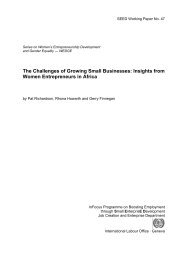manual: women workers' rights and gender equality - International ...
manual: women workers' rights and gender equality - International ...
manual: women workers' rights and gender equality - International ...
You also want an ePaper? Increase the reach of your titles
YUMPU automatically turns print PDFs into web optimized ePapers that Google loves.
union of the exercise of union activities; to be the invocation in order to make a decision on: hiring,<br />
defining <strong>and</strong> assigning of work, vocational training, advancement, promotion, remuneration,<br />
granting social benefits or discipline or termination of employment contract.<br />
Furthermore, it is stated in the Constitution (article 36.1) that Khmer citizens of either sex shall<br />
have the right to choose any employment according to their ability <strong>and</strong> to the needs of the society.<br />
And article 36.2 states that Khmer citizen of either sex shall receive equal pay for equal work.<br />
Content for Conclusion:<br />
Men <strong>and</strong> <strong>women</strong> should have equal opportunity <strong>and</strong> treatment in:<br />
- access to training<br />
- access to employment<br />
- career advancement<br />
- job security: nobody can be fired only because of one of the following reasons: race, sex,<br />
colour, marital status, family responsibilities, pregnancy, political opinion, or being a member of<br />
an organization<br />
- salary: equal pay for work of equal value<br />
- working conditions: working hours, holidays, occupational safety <strong>and</strong> health <strong>and</strong> other<br />
benefits<br />
The first example in the exercise is addressing the issue of equal pay for equal work. It should be<br />
clear that what is happening with Sorya <strong>and</strong> Vibol is not fair. They both should get the same<br />
monthly salary because they perform the same work <strong>and</strong> both have been working for 2 years.<br />
Maternity protection is a measure that helps <strong>women</strong> to have equal opportunities at work. Women<br />
have the right to paid maternity leave before <strong>and</strong> after birth, for instance (see for detailed<br />
information the exercise on Maternity Protection). The boss does not allow Sorya to attend the<br />
training because he thinks she will leave the job. This way of thinking is not allowed. Sorya should<br />
get the opportunity just like anyone else. It is Sorya who decides if she wants to continue her job<br />
after becoming a mother. Her boss can not fire her just because she is pregnant or will be a<br />
mother later on.<br />
Another example of in<strong>equality</strong> is the segregation in jobs. Often <strong>women</strong> are involved in low-skilled<br />
jobs <strong>and</strong> men in higher-skilled jobs. For <strong>women</strong> it is often very hard to come out of this situation<br />
because often men get training to become (more) skilled.<br />
A few more examples come from an ILO research in Cambodia. According to this research,<br />
garment factories are unwilling to recruit men because they think that men are more aggressive<br />
than <strong>women</strong> <strong>and</strong> more difficult to control. Another result from this research was that married<br />
<strong>women</strong> have less chance than single <strong>women</strong> to obtain employment. Both are clear examples of<br />
in<strong>equality</strong> at work. It shows that not only <strong>women</strong> are discriminated against but it happens to men<br />
as well <strong>and</strong> there is also in<strong>equality</strong> between <strong>women</strong> with different marital status.<br />
Workers should undertake action when there is discrimination at the workplace. This can be very<br />
difficult sometimes. Of course people are afraid to lose their job when they complain about certain<br />
situations. A good advice is to fight against in<strong>equality</strong> together. Organize your colleagues; ask for<br />
help, you are always stronger in a group. Think about organizations that can help you, a trade<br />
union for instance or an NGO.<br />
Make sure that <strong>women</strong> also are represented in different committees at your workplace, if there are<br />
any. They can address the issues in these committees <strong>and</strong> ensure follow-up action is taken to<br />
change the situation. Another important thing is: try to get publicity for the problems, in the press<br />
for instance. When a lot of people know that you are fighting for your <strong>rights</strong> the employer or<br />
government feels more pressure.<br />
62

















